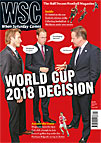 Andy Brassell explains how a controversial move from Bordeaux to domestic rivals Lyon, alongside a reluctance to interact with the press, has found Yoann Gourcuff out of favour with many in France
Andy Brassell explains how a controversial move from Bordeaux to domestic rivals Lyon, alongside a reluctance to interact with the press, has found Yoann Gourcuff out of favour with many in France
Transfers between genuine domestic rivals are never especially clean affairs, and Yoann Gourcuff’s late August move from one recent former French champion to another – Bordeaux to Lyon – is no exception. Three months on, the sensation has settled down and the man himself has started to find some form, but we’re still gathering odd bits of scattered debris from the event.
In many ways, a €22 million (£18m) transfer, a record between French clubs, is just what Ligue 1 required to boost enthusiasm a few days before the start of the season, with the public turned off by the embarrassing soap opera of the national team in South Africa.
Whether it’s what any of the three parties involved needed is a separate question entirely. For Bordeaux, it was another blow to their only recently assembled dynasty, following the shock collapse of their title defence and the departures of Laurent Blanc and Marouane Chamakh. For Lyon, it was a sizeable gamble to try to breathe some life into their own faltering supremacy after a failed attempt to win back the title racked up a €36m loss in 2009-10.
As for Gourcuff, he found himself catapulted into an uneasy situation, with omnipresent Lyon president Jean-Michel Aulas fairly non-committal in his support of beleaguered coach Claude Puel. The pressure on Gourcuff to provide a creative outlet was one thing, but it came in the midst of trying to recover his own swagger after a desperate World Cup for France.
Gourcuff also returned to Bordeaux with Lyon precisely 27 days after making the move east. He arrived to a frosty reception. Bordeaux president Jean-Louis Triaud had been highly critical of Gourcuff’s conduct in “forcing” a move, and new Girondins coach Jean Tigana said he “should have shown more respect” for the club. “If he’s at the level he is today, it’s thanks to Bordeaux,” Tigana smarted.
France Football cranked things up pre-match in the best tabloid tradition, sending reporters to his old haunts in Bordeaux where the waiters whispered how Gourcuff liked a pre-dinner glass of rosé alone, while reading (“always books, never newspapers”).
The Girondins faithful were piqued enough anyway, affording their former idol the most hostile of returns, whistling and booing loudly from the moment he arrived on the away team coach to when his defeated team departed the pitch. Gourcuff actually handled it pretty well, keeping his calm and being Lyon’s best player (in an admittedly shoddy team display) on the night, despite admitting with some understatement it “wasn’t ideal” afterwards.
Blanc taking up the France reins has been the impetus for Gourcuff to rediscover his form. His resurgence in the national team has helped him at club level, rather than the more traditional other way around, having been made to feel important again. The player’s ability to contribute significantly while not necessarily the central figure, which he proved as a perfect midfield foil for Samir Nasri at Wembley recently, is encouraging for Blanc.
Gourcuff’s difficulties attracted added scrutiny not just because of his playing status, but due to his cold stance towards the press. He recently admitted thinking that modern journalism is too personal, rather than football-based. When a player refuses to play the game and shuns the media circus, speculation is only too willing to rise and fill the inevitable vacuum.
This statement was unsurprising. In April, he talked about his and his club’s problems being aggravated by outside interference. “The press, last year, you were on Lyon’s backs,” he said. “This year it’s Bordeaux… you want to find little bits of nonsense to destabilise [the club]. All around the training ground, we feel a different atmosphere to last season and that’s, in part, tied to what you say or write.”
So the press reciprocally feel no need to do their potential golden boy any favours. As recently as November 26, an interview with Paolo Maldini in L’Equipe saw the erstwhile Milan captain chide Gourcuff for his attitude while in Serie A. “His problem here was his behaviour,” Maldini claimed. “Some less talented players [than Gourcuff] won respect at Milan because they gave everything. He didn’t. And he knows it.”
It’s surprising to read such a unifying figure as Maldini single out an individual for criticism in this way. That the Italian chose to pillory for long-gone mistakes a player who was only 22 when he left Milan is perhaps more disappointing than Gourcuff’s alleged original actions. It is, however, a clear marker of how sharply the Frenchman divides opinion.
From WSC 287 January 2011